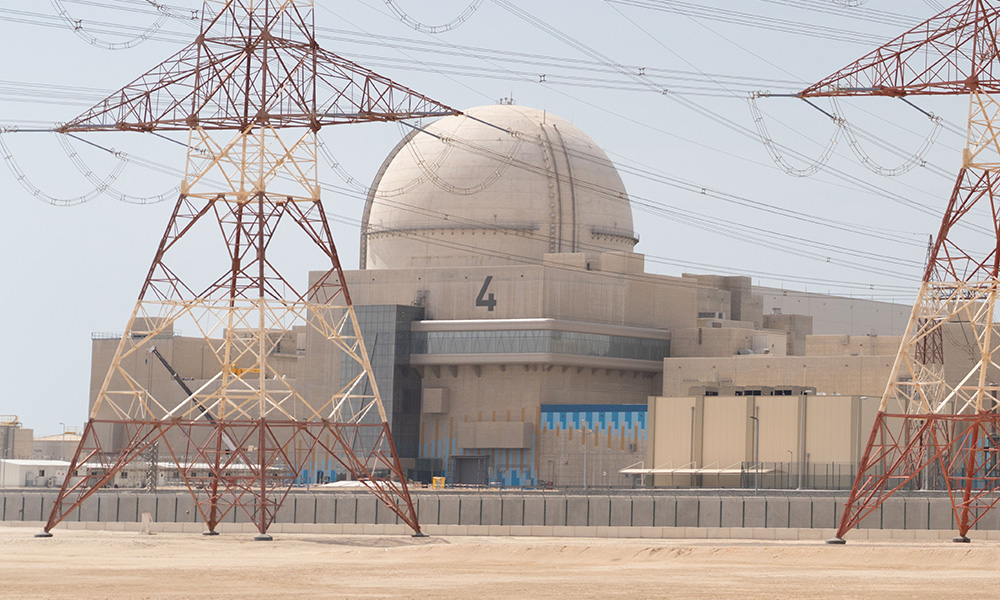Nawah Energy Company has said that it has safely and successfully connected Unit 4 of the Barakah Nuclear Energy Plant to the UAE’s transmission grid. The firm is the operations and maintenance subsidiary of Emirates Nuclear Energy Corporation (ENEC).
Grid connection signifies the delivery of the first megawatts of carbon-free electricity from the fourth reactor of the nuclear energy plant, marking a pivotal moment in the nation’s clean energy transition and journey towards Net Zero by 2050. Unit 4 will add another 1,400MW of clean electricity capacity to power the national grid, representing another significant step forward towards full-fleet operations, further supporting the UAE’s efforts in enhancing grid stability and energy security through abundant around-the-clock zero-emissions electricity, said a statement from ENEC.
The Nawah teams at Barakah are said to have worked closely with the Abu Dhabi Transmission and Despatch Company (TRANSCO), a subsidiary of Abu Dhabi National Energy Company PSJC (TAQA), who constructed the overhead lines to connect the Barakah Plant to the Abu Dhabi grid – ensuring the power generated at Barakah is safely, securely and reliably delivered to consumers across the country.
“We are proud to have achieved another critical milestone for the Barakah Plant, which stands as a testament to the UAE’s leadership in the development of large-scale multi-unit nuclear fleets. Grid connection of Unit 4 puts us well on the path to full-fleet commercial operations, and with that, the ability to generate 40TWh of clean, baseload electricity annually to drive our Net Zero economy, offering a competitive edge to many businesses, decarbonizing hard-to-abate industries, while presenting a global benchmark for the entire nuclear energy industry,” said His Excellency Mohamed Al Hammadi, Managing Director and Chief Executive Officer of ENEC.

Grid connection of Unit 4 solidifies the Barakah Plant’s position as the cornerstone of the UAE’s Net Zero 2050 Strategy, contributing significantly to the nation’s clean energy portfolio. It not only propels the UAE towards achieving its ambitious climate goals but also positions the country as a leader in nuclear energy and decarbonisation. The operational readiness of all four units underscores the UAE’s commitment to diversifying its energy sources, ensuring the reliability and sustainability of its energy sector for the next six decades, the statement added.
The fourth unit is nearing the start of commercial operations. Following grid connection, Unit 4 will undergo the process of gradually raising power levels, known as Power Ascension Testing (PAT). The process will be continuously monitored and tested until maximum electricity production is reached, while adhering to all local regulatory requirements and the highest international standards of safety, quality and security.
Each Unit has been connected to the grid more efficiently than the previous unit, as institutional knowledge and experience are applied to each subsequent unit. Unit 3 was delivered four months faster than the Unit 2 schedule, and five months faster than the Unit 1 schedule, demonstrating the significant benefit of building multiple units within a phased timeline, ENEC explained.
Backed by the success of the Barakah Plant, ENEC is at the forefront of pioneering initiatives aimed at shaping the future of clean energy. ENEC’s focus on advancing nuclear technologies, across large-scale PWR reactors through to Small Modular Reactors (SMR) and microreactors through the ENEC ADVANCE Program, aims to further strengthen the UAE’s leadership in climate action and clean energy transition. This strategic direction not only amplifies the UAE’s contributions to global decarbonization efforts but also showcases the potential of advanced nuclear technologies in meeting the world’s growing energy needs sustainably, the statement concluded.

